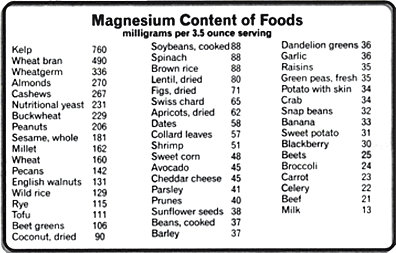Over 95% of the population is deficient in magnesium, a mineral that is necessary for over 300 reactions in the body. It plays a key role in strong bones and teeth, the nervous system, the cardiovascular system, the balancing of hormones, and the detoxification pathways.
The following is a comprehensive list of the benefits from proper magnesium intake:
Regulates and normalizes blood pressure
Promotes restful sleep
Eases muscle cramps and spasms
Decreases insulin resistance
Enhances circulation
Ends migraines
Prevents osteoporosis
Assists in vitamin D absorption
Lowers serum cholesterol levels
Gives rigidity and flexibility to bones
Proper magnesium ratios are important for the body to correctly use calcium in the cells. Even a small deficiency can lead to a dangerous calcium imbalance and lead to problems like calcification and cell death. This manifests itself with symptoms like heart trouble, migraine headaches, muscle cramps and premenstrual cramping.
Magnesium was once attained from the food we consumed from organic farming practices hundreds of years ago in addition to water sourced from wells. But now, with the heavy depletion of quality nutrients in our soil, mostly due to over use of pesticides and fertilizers, in addition to lack of crop rotation, we can no longer attain the adequate amounts of magnesium from the food we eat. Not only that, but our water systems are treated with fluoride and chlorine which binds to magnesium creating a nearly insoluble compound in our body.
Signs and symptoms of magnesium deficiency:
Depression and anxiety
Migraines
Osteoporosis
Low energy
Muscle Spasm
Poor sleep/insomnia
Nervousness
Infertility or PMS
Insulin resistance
Thyroid problems
Gut issues
People who need to supplement with magnesium:
Pregnant/nursing mothers
Females on birth control
Individuals who consume caffeine or alcohol regularly
Individuals on medications for insulin control, hypertension, and even some antibiotics.
Those who drink or bath in unfiltered water
Individuals who do not grow their own organic fruits/vegetables
As you can see everyone could benefit from supplementing with magnesium.
The recommended dose for magnesium is 10mg per kilo of bodyweight. You should take into account the amount of magnesium you consume through your daily multivitamin when determining your additional supplemental needs. Make sure you take them in divided doses throughout the day. Look for magnesium in the form of: citrate, malate, taurate, fumarate, orotate, threonate, bisglycinate, citrate-malate, or glycerophosphate.
I personally take and recommend to my clients to supplement with this magnesium supplement, because it contains all four chelates for greater absorption including: glycinate (liver support); taurate (heart); orotate (cortisol support) and fumarate (supports cells ability to convert energy).
I strongly encourage you to start supplementing with magnesium in addition to a multi-vitamin. And for the love of God, if you aren’t supplementing with a multi-vitamin you are not doing yourself any favors. 80% of doctors suggest that everyone take a multi-vitamin. And the other 20%, maybe they enjoy writing prescriptions… A multi-vitamin is insurance and fills in any of the missing gaps from your food intake. Let’s face it; the typical diet is not providing the necessary vitamins and minerals to allow the body to function properly.



Leave a Reply